Evaluating Market Failure: The Economics of Banning Petrol Cars
VerifiedAdded on 2023/01/23
|11
|2122
|51
Report
AI Summary
This report examines the economic implications of banning petrol and diesel cars, focusing on the concept of market failure arising from negative externalities associated with their use. The report highlights that emissions from these vehicles contribute to environmental damage and air pollution, leading to a market failure where the social costs are not reflected in market prices. It analyzes how banning petrol and diesel cars aims to correct this market failure by reducing emissions and promoting the adoption of electric vehicles. The report also explores the impact of this policy on related markets, such as the fuel market, which experiences a contraction due to decreased demand, and the electric car market, which expands as consumers seek alternative transportation options. The analysis concludes that government intervention, through banning sales, is a way to attain a more socially efficient outcome by addressing the negative consumption externality and fostering a shift towards cleaner transportation alternatives. Desklib provides access to similar solved assignments and study resources for students.
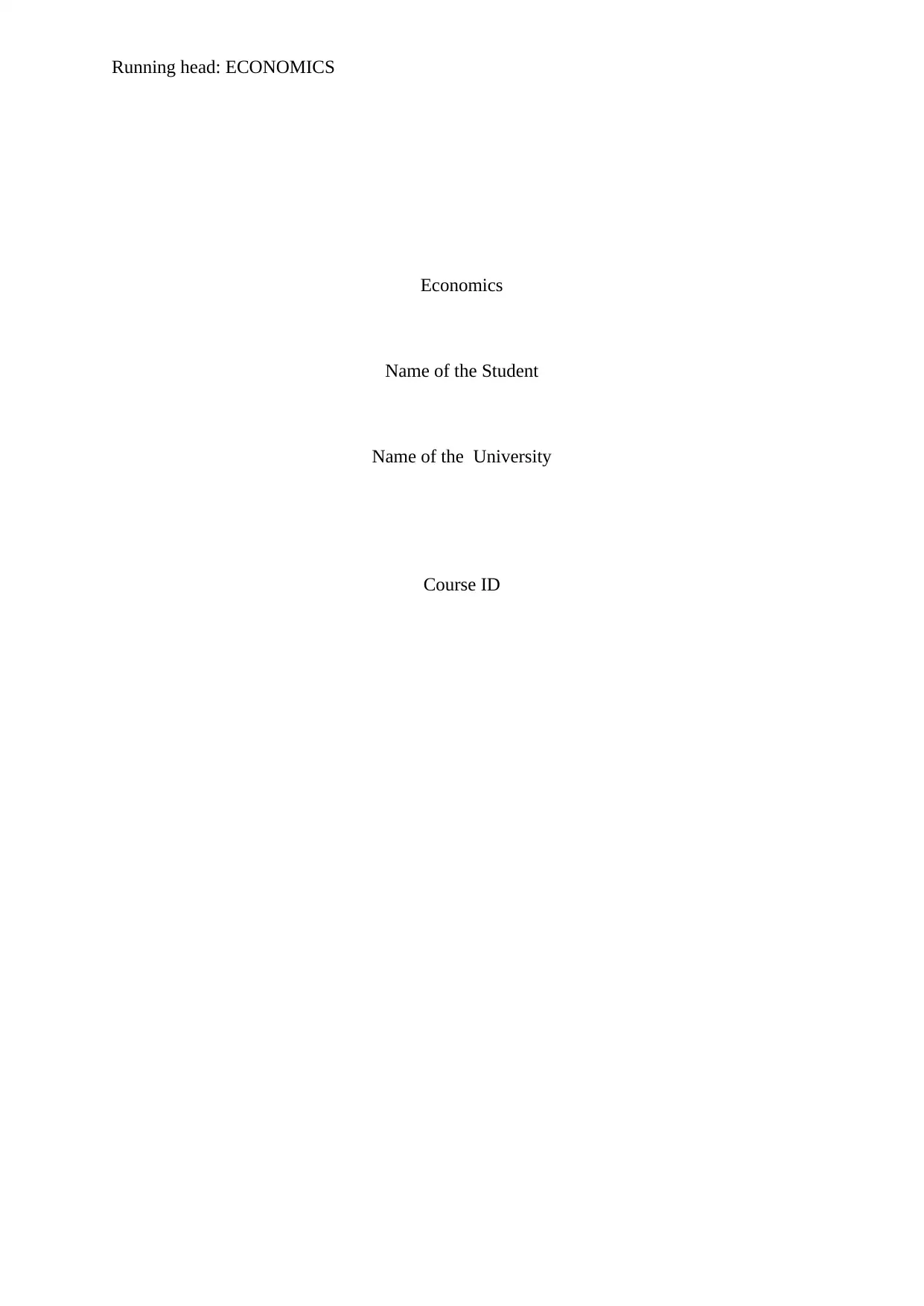
Running head: ECONOMICS
Economics
Name of the Student
Name of the University
Course ID
Economics
Name of the Student
Name of the University
Course ID
Paraphrase This Document
Need a fresh take? Get an instant paraphrase of this document with our AI Paraphraser
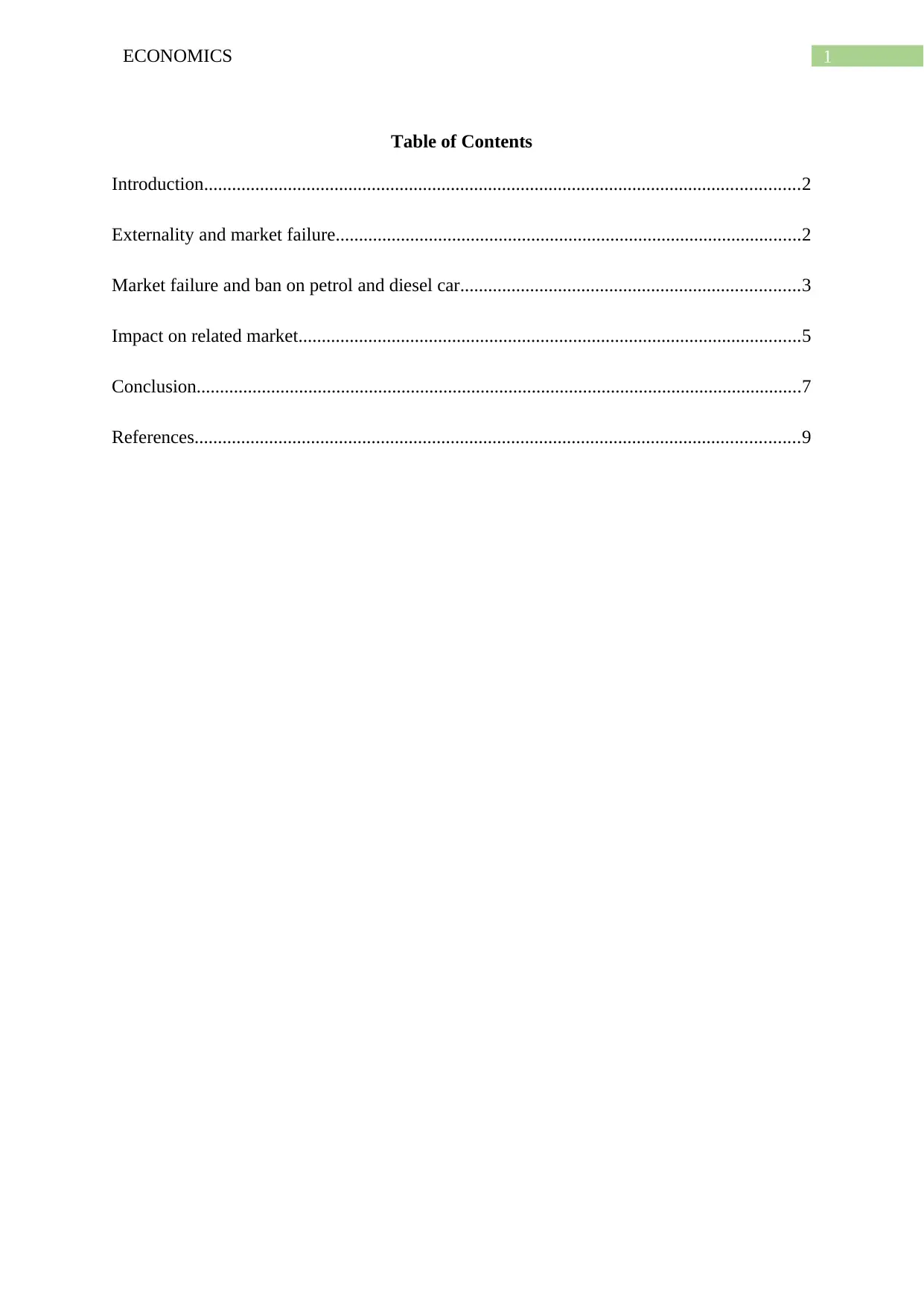
1ECONOMICS
Table of Contents
Introduction................................................................................................................................2
Externality and market failure....................................................................................................2
Market failure and ban on petrol and diesel car.........................................................................3
Impact on related market............................................................................................................5
Conclusion..................................................................................................................................7
References..................................................................................................................................9
Table of Contents
Introduction................................................................................................................................2
Externality and market failure....................................................................................................2
Market failure and ban on petrol and diesel car.........................................................................3
Impact on related market............................................................................................................5
Conclusion..................................................................................................................................7
References..................................................................................................................................9
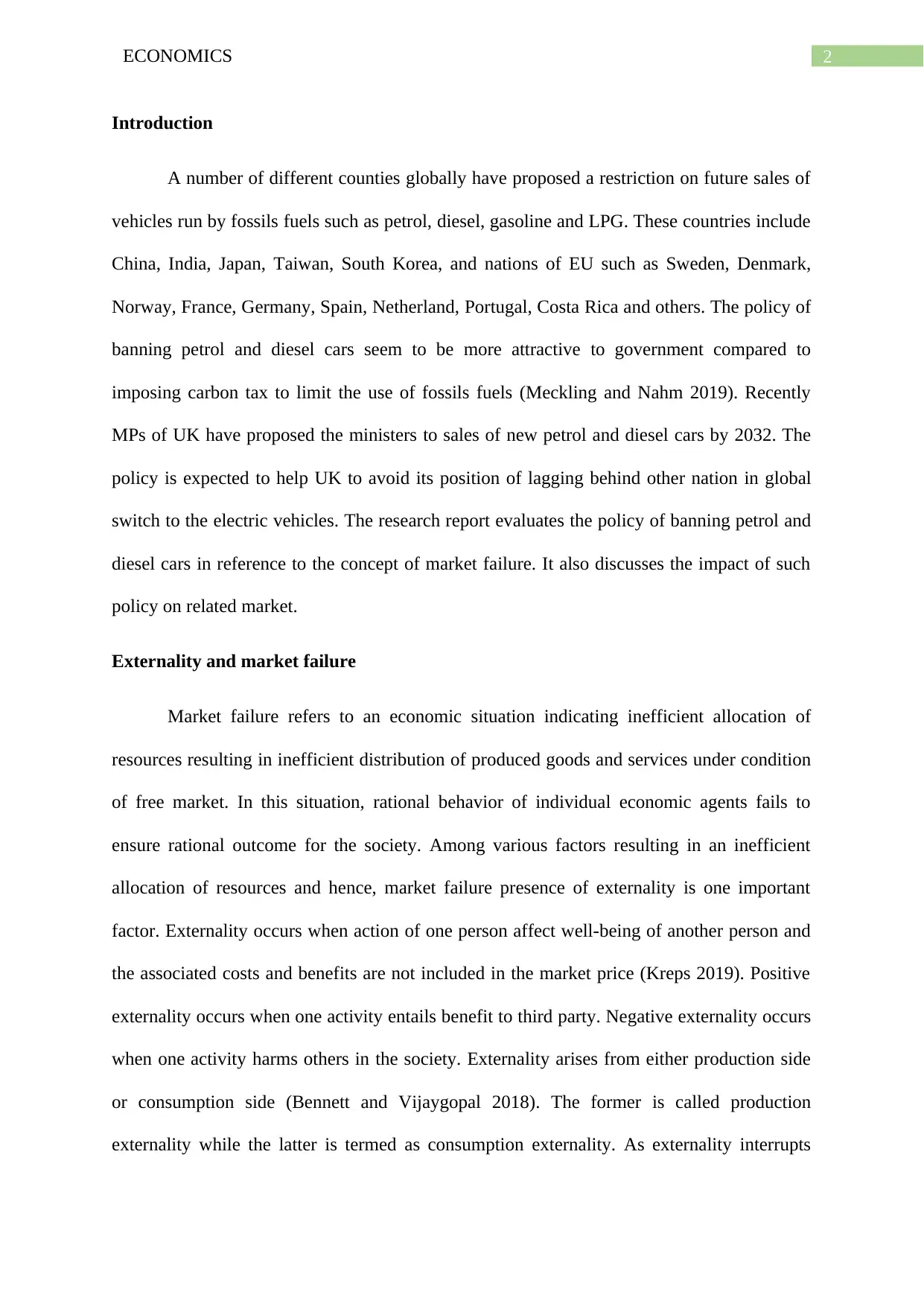
2ECONOMICS
Introduction
A number of different counties globally have proposed a restriction on future sales of
vehicles run by fossils fuels such as petrol, diesel, gasoline and LPG. These countries include
China, India, Japan, Taiwan, South Korea, and nations of EU such as Sweden, Denmark,
Norway, France, Germany, Spain, Netherland, Portugal, Costa Rica and others. The policy of
banning petrol and diesel cars seem to be more attractive to government compared to
imposing carbon tax to limit the use of fossils fuels (Meckling and Nahm 2019). Recently
MPs of UK have proposed the ministers to sales of new petrol and diesel cars by 2032. The
policy is expected to help UK to avoid its position of lagging behind other nation in global
switch to the electric vehicles. The research report evaluates the policy of banning petrol and
diesel cars in reference to the concept of market failure. It also discusses the impact of such
policy on related market.
Externality and market failure
Market failure refers to an economic situation indicating inefficient allocation of
resources resulting in inefficient distribution of produced goods and services under condition
of free market. In this situation, rational behavior of individual economic agents fails to
ensure rational outcome for the society. Among various factors resulting in an inefficient
allocation of resources and hence, market failure presence of externality is one important
factor. Externality occurs when action of one person affect well-being of another person and
the associated costs and benefits are not included in the market price (Kreps 2019). Positive
externality occurs when one activity entails benefit to third party. Negative externality occurs
when one activity harms others in the society. Externality arises from either production side
or consumption side (Bennett and Vijaygopal 2018). The former is called production
externality while the latter is termed as consumption externality. As externality interrupts
Introduction
A number of different counties globally have proposed a restriction on future sales of
vehicles run by fossils fuels such as petrol, diesel, gasoline and LPG. These countries include
China, India, Japan, Taiwan, South Korea, and nations of EU such as Sweden, Denmark,
Norway, France, Germany, Spain, Netherland, Portugal, Costa Rica and others. The policy of
banning petrol and diesel cars seem to be more attractive to government compared to
imposing carbon tax to limit the use of fossils fuels (Meckling and Nahm 2019). Recently
MPs of UK have proposed the ministers to sales of new petrol and diesel cars by 2032. The
policy is expected to help UK to avoid its position of lagging behind other nation in global
switch to the electric vehicles. The research report evaluates the policy of banning petrol and
diesel cars in reference to the concept of market failure. It also discusses the impact of such
policy on related market.
Externality and market failure
Market failure refers to an economic situation indicating inefficient allocation of
resources resulting in inefficient distribution of produced goods and services under condition
of free market. In this situation, rational behavior of individual economic agents fails to
ensure rational outcome for the society. Among various factors resulting in an inefficient
allocation of resources and hence, market failure presence of externality is one important
factor. Externality occurs when action of one person affect well-being of another person and
the associated costs and benefits are not included in the market price (Kreps 2019). Positive
externality occurs when one activity entails benefit to third party. Negative externality occurs
when one activity harms others in the society. Externality arises from either production side
or consumption side (Bennett and Vijaygopal 2018). The former is called production
externality while the latter is termed as consumption externality. As externality interrupts
You're viewing a preview
Unlock full access by subscribing today!
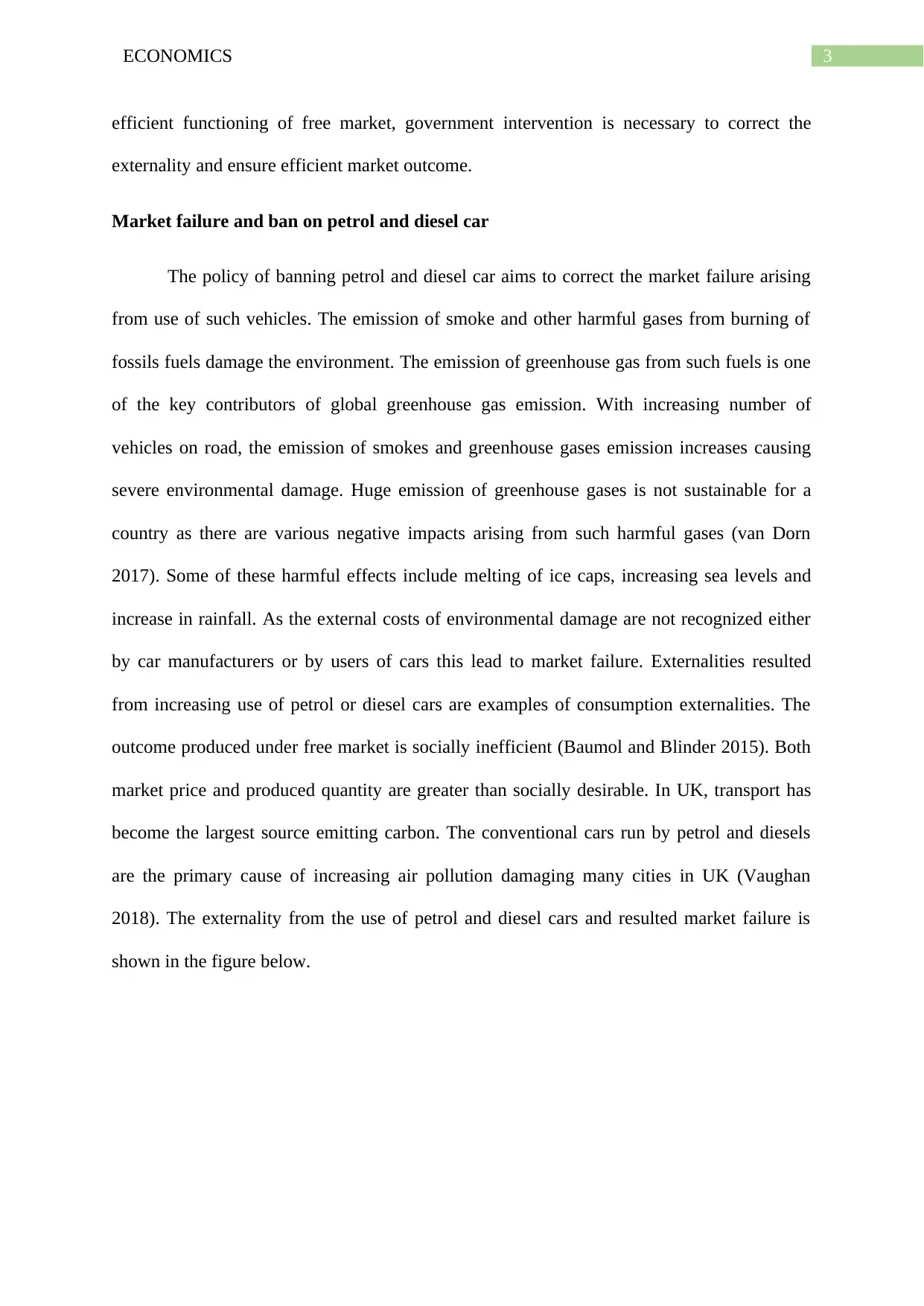
3ECONOMICS
efficient functioning of free market, government intervention is necessary to correct the
externality and ensure efficient market outcome.
Market failure and ban on petrol and diesel car
The policy of banning petrol and diesel car aims to correct the market failure arising
from use of such vehicles. The emission of smoke and other harmful gases from burning of
fossils fuels damage the environment. The emission of greenhouse gas from such fuels is one
of the key contributors of global greenhouse gas emission. With increasing number of
vehicles on road, the emission of smokes and greenhouse gases emission increases causing
severe environmental damage. Huge emission of greenhouse gases is not sustainable for a
country as there are various negative impacts arising from such harmful gases (van Dorn
2017). Some of these harmful effects include melting of ice caps, increasing sea levels and
increase in rainfall. As the external costs of environmental damage are not recognized either
by car manufacturers or by users of cars this lead to market failure. Externalities resulted
from increasing use of petrol or diesel cars are examples of consumption externalities. The
outcome produced under free market is socially inefficient (Baumol and Blinder 2015). Both
market price and produced quantity are greater than socially desirable. In UK, transport has
become the largest source emitting carbon. The conventional cars run by petrol and diesels
are the primary cause of increasing air pollution damaging many cities in UK (Vaughan
2018). The externality from the use of petrol and diesel cars and resulted market failure is
shown in the figure below.
efficient functioning of free market, government intervention is necessary to correct the
externality and ensure efficient market outcome.
Market failure and ban on petrol and diesel car
The policy of banning petrol and diesel car aims to correct the market failure arising
from use of such vehicles. The emission of smoke and other harmful gases from burning of
fossils fuels damage the environment. The emission of greenhouse gas from such fuels is one
of the key contributors of global greenhouse gas emission. With increasing number of
vehicles on road, the emission of smokes and greenhouse gases emission increases causing
severe environmental damage. Huge emission of greenhouse gases is not sustainable for a
country as there are various negative impacts arising from such harmful gases (van Dorn
2017). Some of these harmful effects include melting of ice caps, increasing sea levels and
increase in rainfall. As the external costs of environmental damage are not recognized either
by car manufacturers or by users of cars this lead to market failure. Externalities resulted
from increasing use of petrol or diesel cars are examples of consumption externalities. The
outcome produced under free market is socially inefficient (Baumol and Blinder 2015). Both
market price and produced quantity are greater than socially desirable. In UK, transport has
become the largest source emitting carbon. The conventional cars run by petrol and diesels
are the primary cause of increasing air pollution damaging many cities in UK (Vaughan
2018). The externality from the use of petrol and diesel cars and resulted market failure is
shown in the figure below.
Paraphrase This Document
Need a fresh take? Get an instant paraphrase of this document with our AI Paraphraser
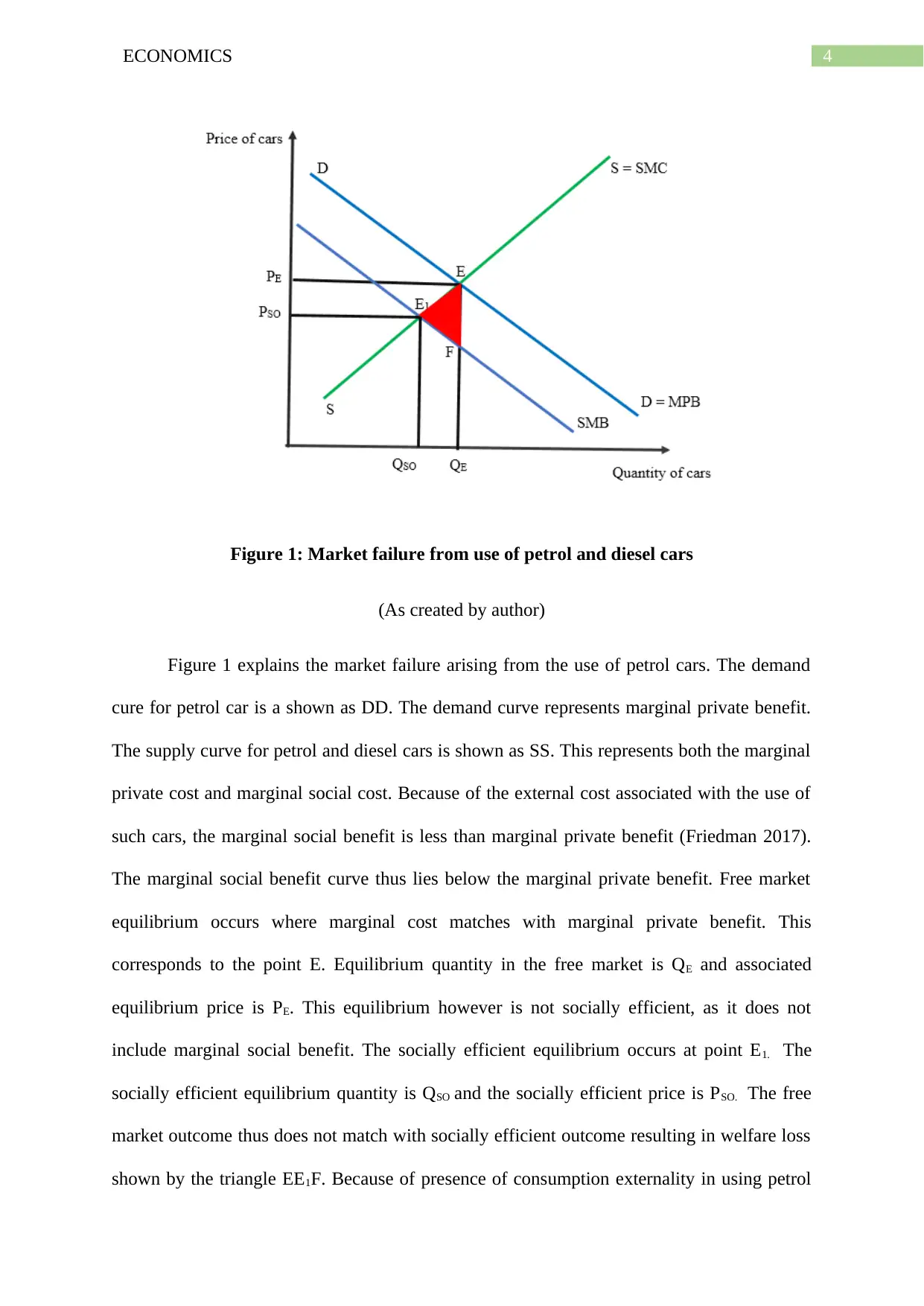
4ECONOMICS
Figure 1: Market failure from use of petrol and diesel cars
(As created by author)
Figure 1 explains the market failure arising from the use of petrol cars. The demand
cure for petrol car is a shown as DD. The demand curve represents marginal private benefit.
The supply curve for petrol and diesel cars is shown as SS. This represents both the marginal
private cost and marginal social cost. Because of the external cost associated with the use of
such cars, the marginal social benefit is less than marginal private benefit (Friedman 2017).
The marginal social benefit curve thus lies below the marginal private benefit. Free market
equilibrium occurs where marginal cost matches with marginal private benefit. This
corresponds to the point E. Equilibrium quantity in the free market is QE and associated
equilibrium price is PE. This equilibrium however is not socially efficient, as it does not
include marginal social benefit. The socially efficient equilibrium occurs at point E1. The
socially efficient equilibrium quantity is QSO and the socially efficient price is PSO. The free
market outcome thus does not match with socially efficient outcome resulting in welfare loss
shown by the triangle EE1F. Because of presence of consumption externality in using petrol
Figure 1: Market failure from use of petrol and diesel cars
(As created by author)
Figure 1 explains the market failure arising from the use of petrol cars. The demand
cure for petrol car is a shown as DD. The demand curve represents marginal private benefit.
The supply curve for petrol and diesel cars is shown as SS. This represents both the marginal
private cost and marginal social cost. Because of the external cost associated with the use of
such cars, the marginal social benefit is less than marginal private benefit (Friedman 2017).
The marginal social benefit curve thus lies below the marginal private benefit. Free market
equilibrium occurs where marginal cost matches with marginal private benefit. This
corresponds to the point E. Equilibrium quantity in the free market is QE and associated
equilibrium price is PE. This equilibrium however is not socially efficient, as it does not
include marginal social benefit. The socially efficient equilibrium occurs at point E1. The
socially efficient equilibrium quantity is QSO and the socially efficient price is PSO. The free
market outcome thus does not match with socially efficient outcome resulting in welfare loss
shown by the triangle EE1F. Because of presence of consumption externality in using petrol
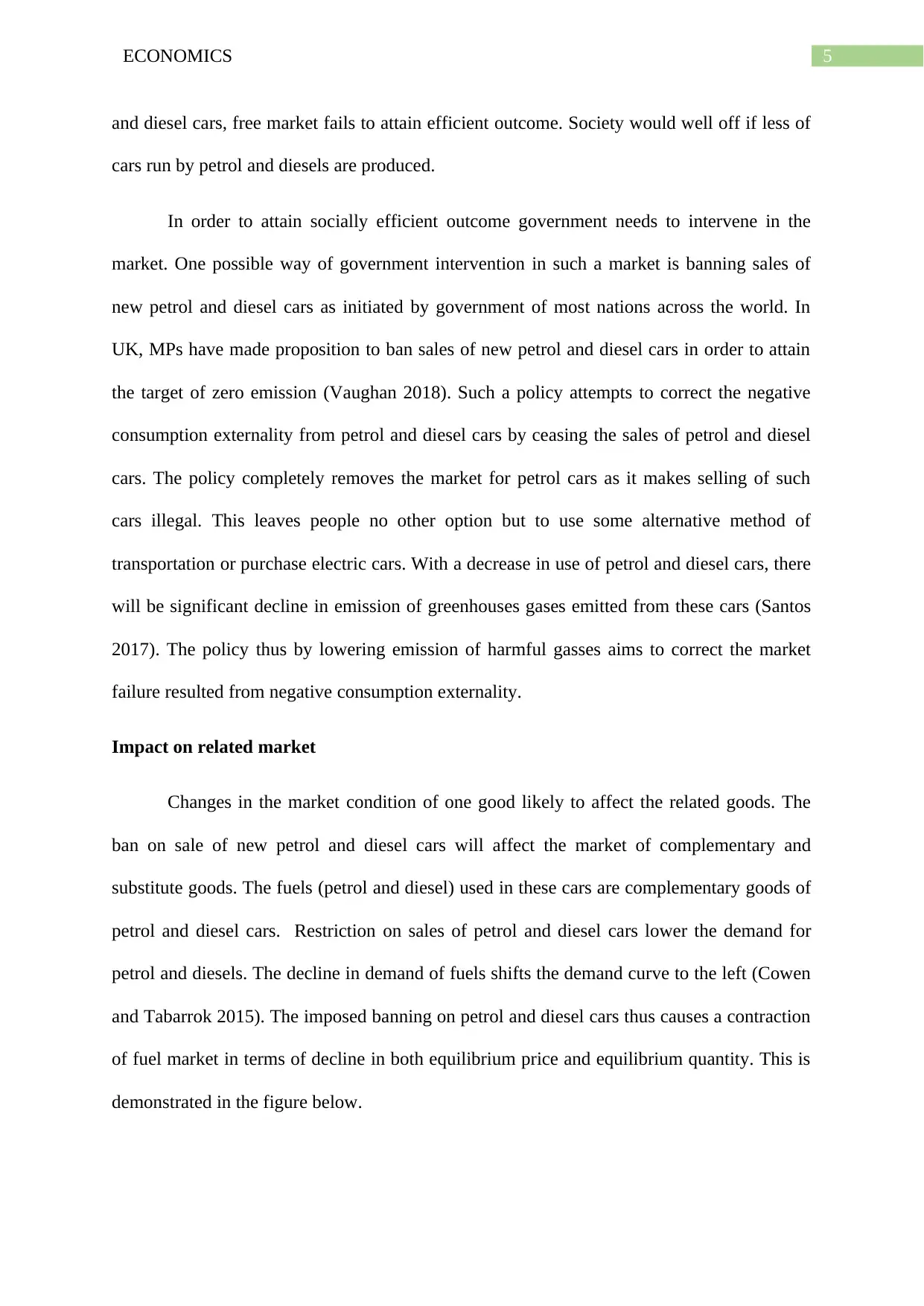
5ECONOMICS
and diesel cars, free market fails to attain efficient outcome. Society would well off if less of
cars run by petrol and diesels are produced.
In order to attain socially efficient outcome government needs to intervene in the
market. One possible way of government intervention in such a market is banning sales of
new petrol and diesel cars as initiated by government of most nations across the world. In
UK, MPs have made proposition to ban sales of new petrol and diesel cars in order to attain
the target of zero emission (Vaughan 2018). Such a policy attempts to correct the negative
consumption externality from petrol and diesel cars by ceasing the sales of petrol and diesel
cars. The policy completely removes the market for petrol cars as it makes selling of such
cars illegal. This leaves people no other option but to use some alternative method of
transportation or purchase electric cars. With a decrease in use of petrol and diesel cars, there
will be significant decline in emission of greenhouses gases emitted from these cars (Santos
2017). The policy thus by lowering emission of harmful gasses aims to correct the market
failure resulted from negative consumption externality.
Impact on related market
Changes in the market condition of one good likely to affect the related goods. The
ban on sale of new petrol and diesel cars will affect the market of complementary and
substitute goods. The fuels (petrol and diesel) used in these cars are complementary goods of
petrol and diesel cars. Restriction on sales of petrol and diesel cars lower the demand for
petrol and diesels. The decline in demand of fuels shifts the demand curve to the left (Cowen
and Tabarrok 2015). The imposed banning on petrol and diesel cars thus causes a contraction
of fuel market in terms of decline in both equilibrium price and equilibrium quantity. This is
demonstrated in the figure below.
and diesel cars, free market fails to attain efficient outcome. Society would well off if less of
cars run by petrol and diesels are produced.
In order to attain socially efficient outcome government needs to intervene in the
market. One possible way of government intervention in such a market is banning sales of
new petrol and diesel cars as initiated by government of most nations across the world. In
UK, MPs have made proposition to ban sales of new petrol and diesel cars in order to attain
the target of zero emission (Vaughan 2018). Such a policy attempts to correct the negative
consumption externality from petrol and diesel cars by ceasing the sales of petrol and diesel
cars. The policy completely removes the market for petrol cars as it makes selling of such
cars illegal. This leaves people no other option but to use some alternative method of
transportation or purchase electric cars. With a decrease in use of petrol and diesel cars, there
will be significant decline in emission of greenhouses gases emitted from these cars (Santos
2017). The policy thus by lowering emission of harmful gasses aims to correct the market
failure resulted from negative consumption externality.
Impact on related market
Changes in the market condition of one good likely to affect the related goods. The
ban on sale of new petrol and diesel cars will affect the market of complementary and
substitute goods. The fuels (petrol and diesel) used in these cars are complementary goods of
petrol and diesel cars. Restriction on sales of petrol and diesel cars lower the demand for
petrol and diesels. The decline in demand of fuels shifts the demand curve to the left (Cowen
and Tabarrok 2015). The imposed banning on petrol and diesel cars thus causes a contraction
of fuel market in terms of decline in both equilibrium price and equilibrium quantity. This is
demonstrated in the figure below.
You're viewing a preview
Unlock full access by subscribing today!
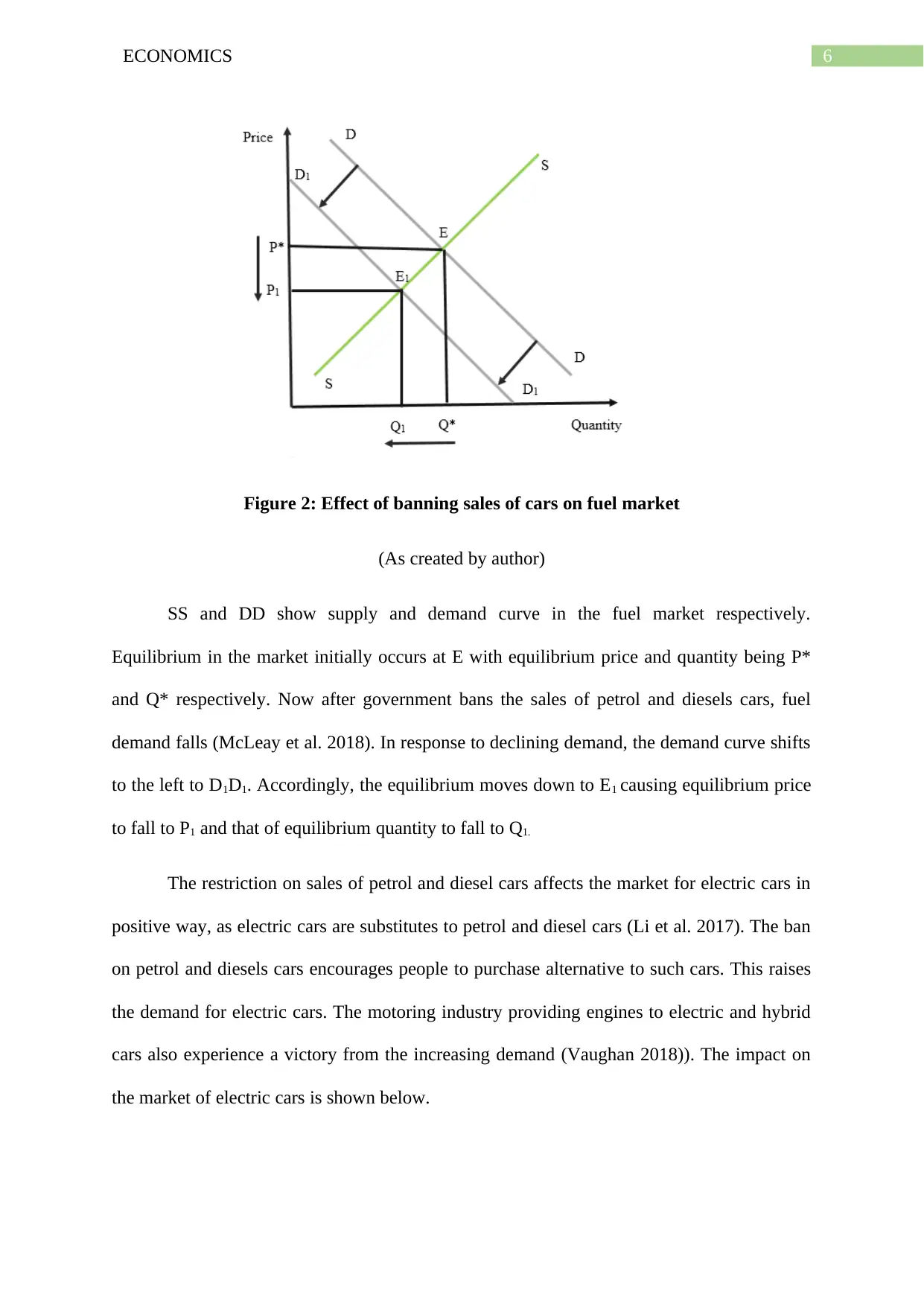
6ECONOMICS
Figure 2: Effect of banning sales of cars on fuel market
(As created by author)
SS and DD show supply and demand curve in the fuel market respectively.
Equilibrium in the market initially occurs at E with equilibrium price and quantity being P*
and Q* respectively. Now after government bans the sales of petrol and diesels cars, fuel
demand falls (McLeay et al. 2018). In response to declining demand, the demand curve shifts
to the left to D1D1. Accordingly, the equilibrium moves down to E1 causing equilibrium price
to fall to P1 and that of equilibrium quantity to fall to Q1.
The restriction on sales of petrol and diesel cars affects the market for electric cars in
positive way, as electric cars are substitutes to petrol and diesel cars (Li et al. 2017). The ban
on petrol and diesels cars encourages people to purchase alternative to such cars. This raises
the demand for electric cars. The motoring industry providing engines to electric and hybrid
cars also experience a victory from the increasing demand (Vaughan 2018)). The impact on
the market of electric cars is shown below.
Figure 2: Effect of banning sales of cars on fuel market
(As created by author)
SS and DD show supply and demand curve in the fuel market respectively.
Equilibrium in the market initially occurs at E with equilibrium price and quantity being P*
and Q* respectively. Now after government bans the sales of petrol and diesels cars, fuel
demand falls (McLeay et al. 2018). In response to declining demand, the demand curve shifts
to the left to D1D1. Accordingly, the equilibrium moves down to E1 causing equilibrium price
to fall to P1 and that of equilibrium quantity to fall to Q1.
The restriction on sales of petrol and diesel cars affects the market for electric cars in
positive way, as electric cars are substitutes to petrol and diesel cars (Li et al. 2017). The ban
on petrol and diesels cars encourages people to purchase alternative to such cars. This raises
the demand for electric cars. The motoring industry providing engines to electric and hybrid
cars also experience a victory from the increasing demand (Vaughan 2018)). The impact on
the market of electric cars is shown below.
Paraphrase This Document
Need a fresh take? Get an instant paraphrase of this document with our AI Paraphraser
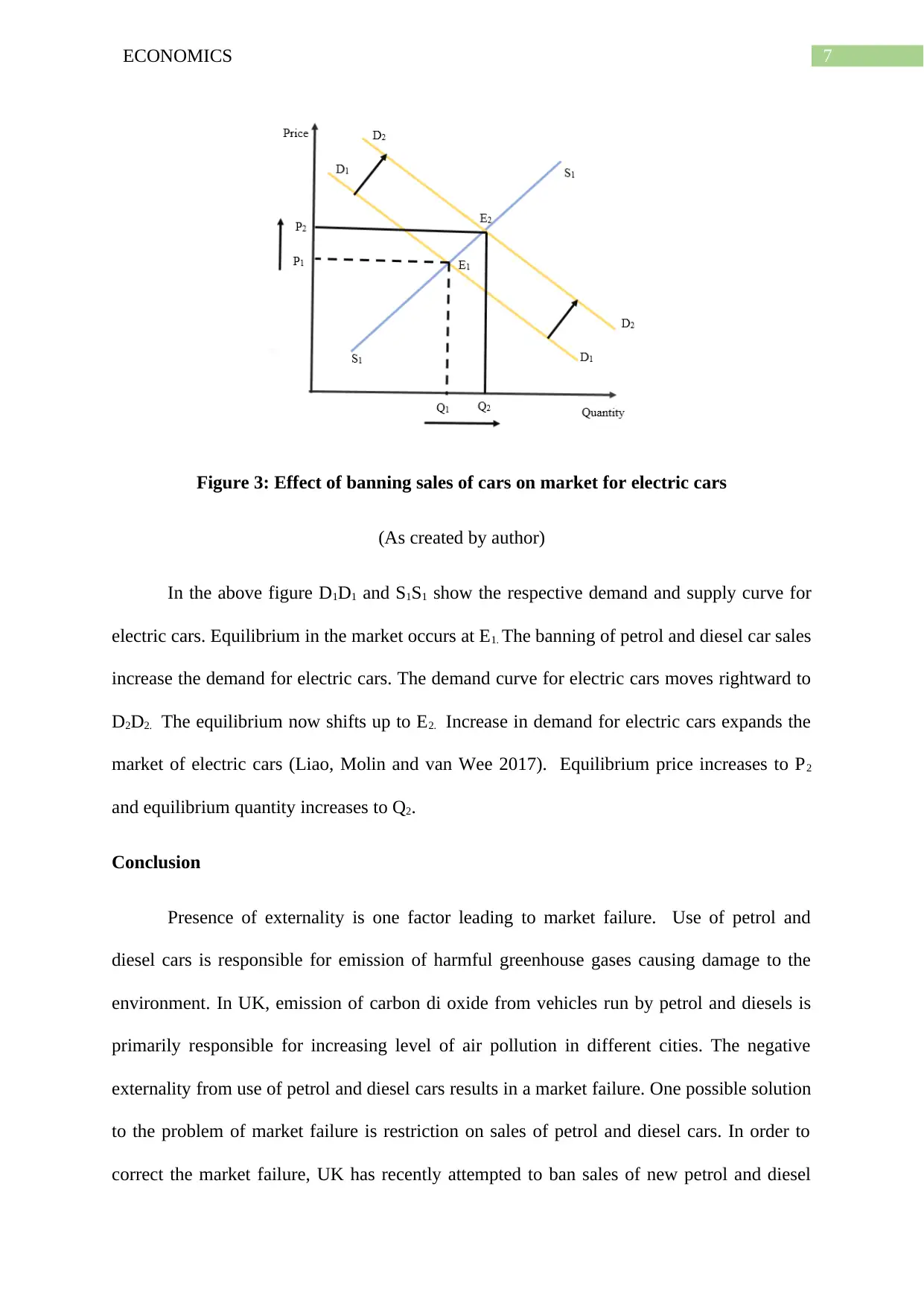
7ECONOMICS
Figure 3: Effect of banning sales of cars on market for electric cars
(As created by author)
In the above figure D1D1 and S1S1 show the respective demand and supply curve for
electric cars. Equilibrium in the market occurs at E1. The banning of petrol and diesel car sales
increase the demand for electric cars. The demand curve for electric cars moves rightward to
D2D2. The equilibrium now shifts up to E2. Increase in demand for electric cars expands the
market of electric cars (Liao, Molin and van Wee 2017). Equilibrium price increases to P2
and equilibrium quantity increases to Q2.
Conclusion
Presence of externality is one factor leading to market failure. Use of petrol and
diesel cars is responsible for emission of harmful greenhouse gases causing damage to the
environment. In UK, emission of carbon di oxide from vehicles run by petrol and diesels is
primarily responsible for increasing level of air pollution in different cities. The negative
externality from use of petrol and diesel cars results in a market failure. One possible solution
to the problem of market failure is restriction on sales of petrol and diesel cars. In order to
correct the market failure, UK has recently attempted to ban sales of new petrol and diesel
Figure 3: Effect of banning sales of cars on market for electric cars
(As created by author)
In the above figure D1D1 and S1S1 show the respective demand and supply curve for
electric cars. Equilibrium in the market occurs at E1. The banning of petrol and diesel car sales
increase the demand for electric cars. The demand curve for electric cars moves rightward to
D2D2. The equilibrium now shifts up to E2. Increase in demand for electric cars expands the
market of electric cars (Liao, Molin and van Wee 2017). Equilibrium price increases to P2
and equilibrium quantity increases to Q2.
Conclusion
Presence of externality is one factor leading to market failure. Use of petrol and
diesel cars is responsible for emission of harmful greenhouse gases causing damage to the
environment. In UK, emission of carbon di oxide from vehicles run by petrol and diesels is
primarily responsible for increasing level of air pollution in different cities. The negative
externality from use of petrol and diesel cars results in a market failure. One possible solution
to the problem of market failure is restriction on sales of petrol and diesel cars. In order to
correct the market failure, UK has recently attempted to ban sales of new petrol and diesel
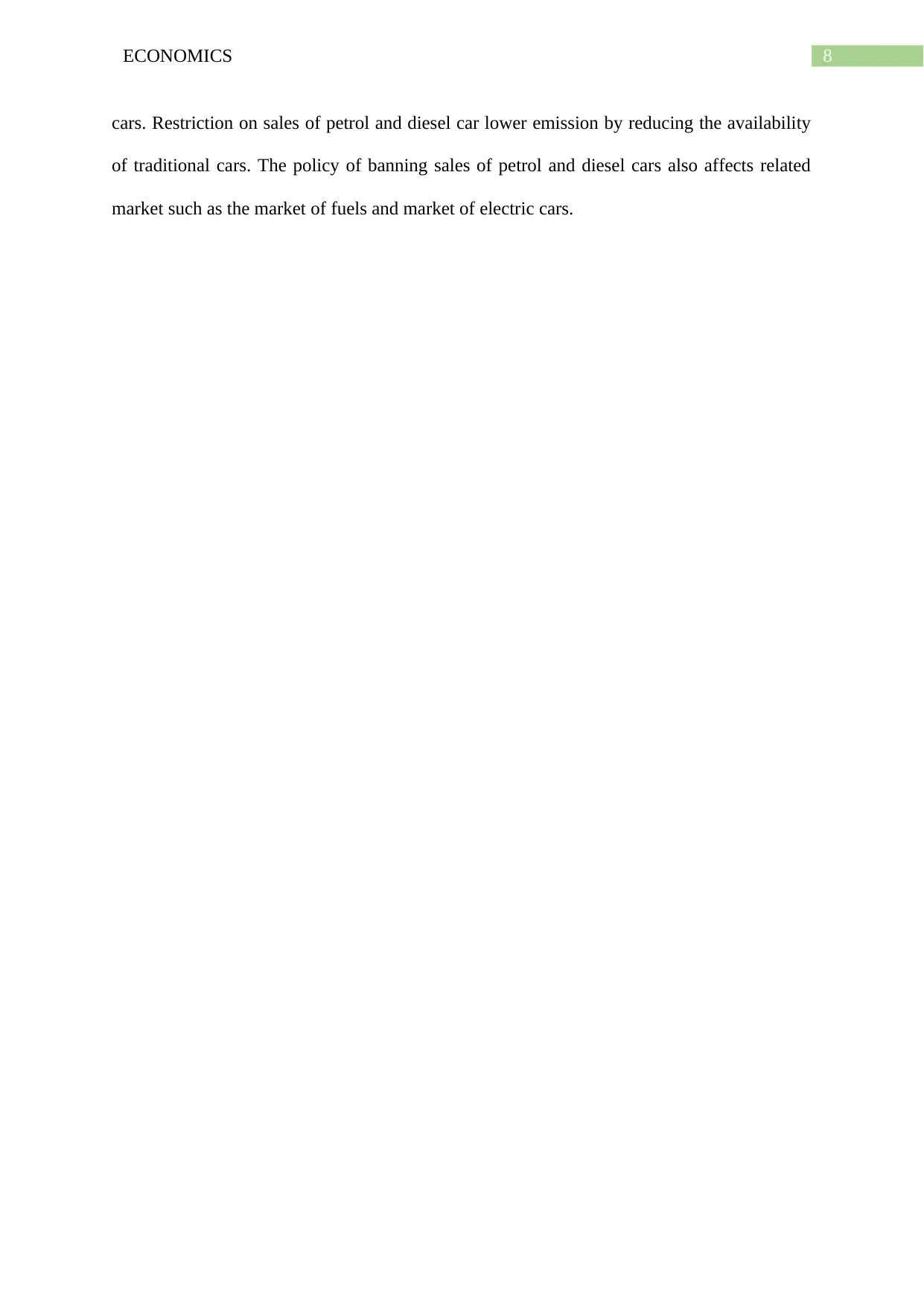
8ECONOMICS
cars. Restriction on sales of petrol and diesel car lower emission by reducing the availability
of traditional cars. The policy of banning sales of petrol and diesel cars also affects related
market such as the market of fuels and market of electric cars.
cars. Restriction on sales of petrol and diesel car lower emission by reducing the availability
of traditional cars. The policy of banning sales of petrol and diesel cars also affects related
market such as the market of fuels and market of electric cars.
You're viewing a preview
Unlock full access by subscribing today!
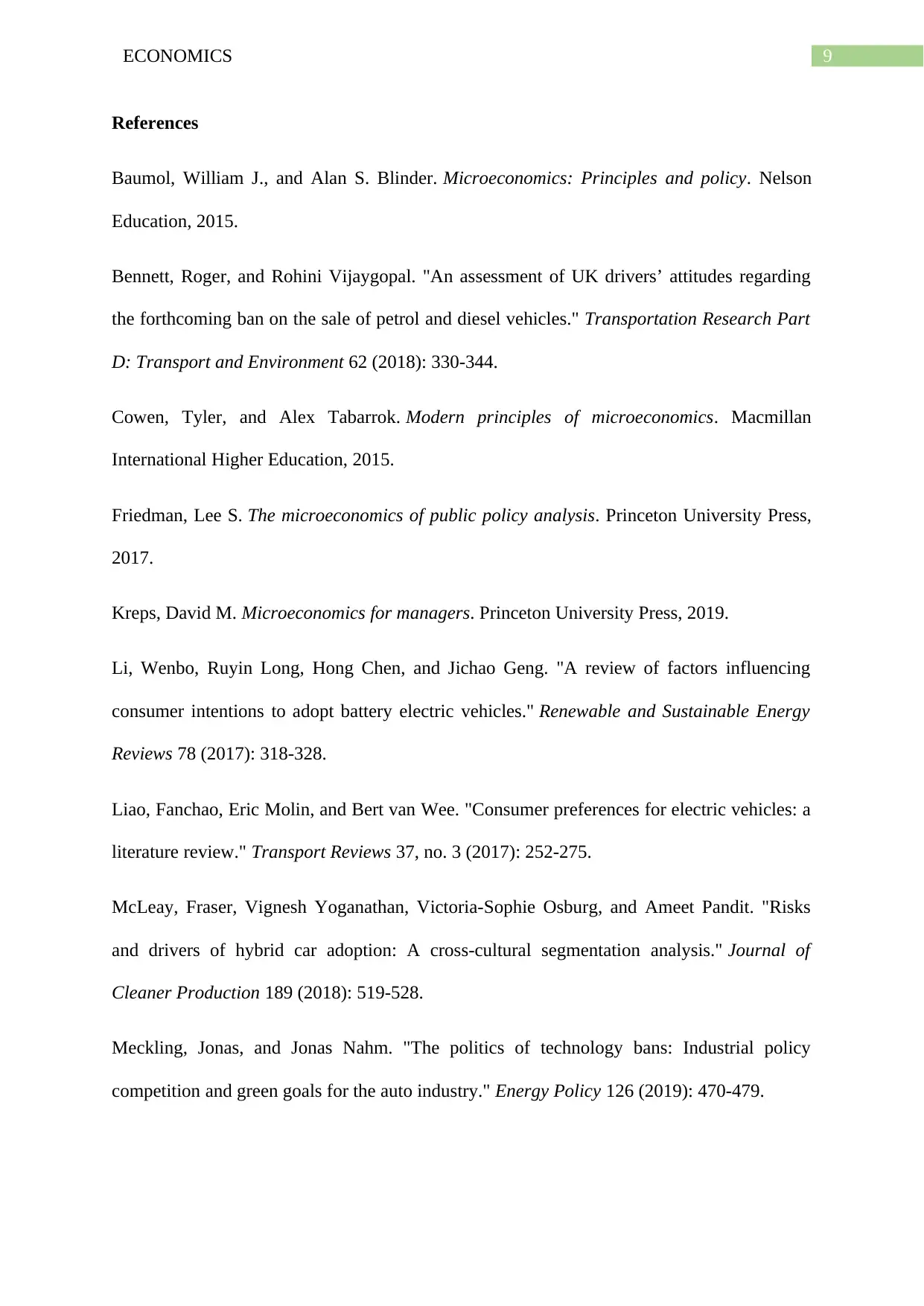
9ECONOMICS
References
Baumol, William J., and Alan S. Blinder. Microeconomics: Principles and policy. Nelson
Education, 2015.
Bennett, Roger, and Rohini Vijaygopal. "An assessment of UK drivers’ attitudes regarding
the forthcoming ban on the sale of petrol and diesel vehicles." Transportation Research Part
D: Transport and Environment 62 (2018): 330-344.
Cowen, Tyler, and Alex Tabarrok. Modern principles of microeconomics. Macmillan
International Higher Education, 2015.
Friedman, Lee S. The microeconomics of public policy analysis. Princeton University Press,
2017.
Kreps, David M. Microeconomics for managers. Princeton University Press, 2019.
Li, Wenbo, Ruyin Long, Hong Chen, and Jichao Geng. "A review of factors influencing
consumer intentions to adopt battery electric vehicles." Renewable and Sustainable Energy
Reviews 78 (2017): 318-328.
Liao, Fanchao, Eric Molin, and Bert van Wee. "Consumer preferences for electric vehicles: a
literature review." Transport Reviews 37, no. 3 (2017): 252-275.
McLeay, Fraser, Vignesh Yoganathan, Victoria-Sophie Osburg, and Ameet Pandit. "Risks
and drivers of hybrid car adoption: A cross-cultural segmentation analysis." Journal of
Cleaner Production 189 (2018): 519-528.
Meckling, Jonas, and Jonas Nahm. "The politics of technology bans: Industrial policy
competition and green goals for the auto industry." Energy Policy 126 (2019): 470-479.
References
Baumol, William J., and Alan S. Blinder. Microeconomics: Principles and policy. Nelson
Education, 2015.
Bennett, Roger, and Rohini Vijaygopal. "An assessment of UK drivers’ attitudes regarding
the forthcoming ban on the sale of petrol and diesel vehicles." Transportation Research Part
D: Transport and Environment 62 (2018): 330-344.
Cowen, Tyler, and Alex Tabarrok. Modern principles of microeconomics. Macmillan
International Higher Education, 2015.
Friedman, Lee S. The microeconomics of public policy analysis. Princeton University Press,
2017.
Kreps, David M. Microeconomics for managers. Princeton University Press, 2019.
Li, Wenbo, Ruyin Long, Hong Chen, and Jichao Geng. "A review of factors influencing
consumer intentions to adopt battery electric vehicles." Renewable and Sustainable Energy
Reviews 78 (2017): 318-328.
Liao, Fanchao, Eric Molin, and Bert van Wee. "Consumer preferences for electric vehicles: a
literature review." Transport Reviews 37, no. 3 (2017): 252-275.
McLeay, Fraser, Vignesh Yoganathan, Victoria-Sophie Osburg, and Ameet Pandit. "Risks
and drivers of hybrid car adoption: A cross-cultural segmentation analysis." Journal of
Cleaner Production 189 (2018): 519-528.
Meckling, Jonas, and Jonas Nahm. "The politics of technology bans: Industrial policy
competition and green goals for the auto industry." Energy Policy 126 (2019): 470-479.
Paraphrase This Document
Need a fresh take? Get an instant paraphrase of this document with our AI Paraphraser
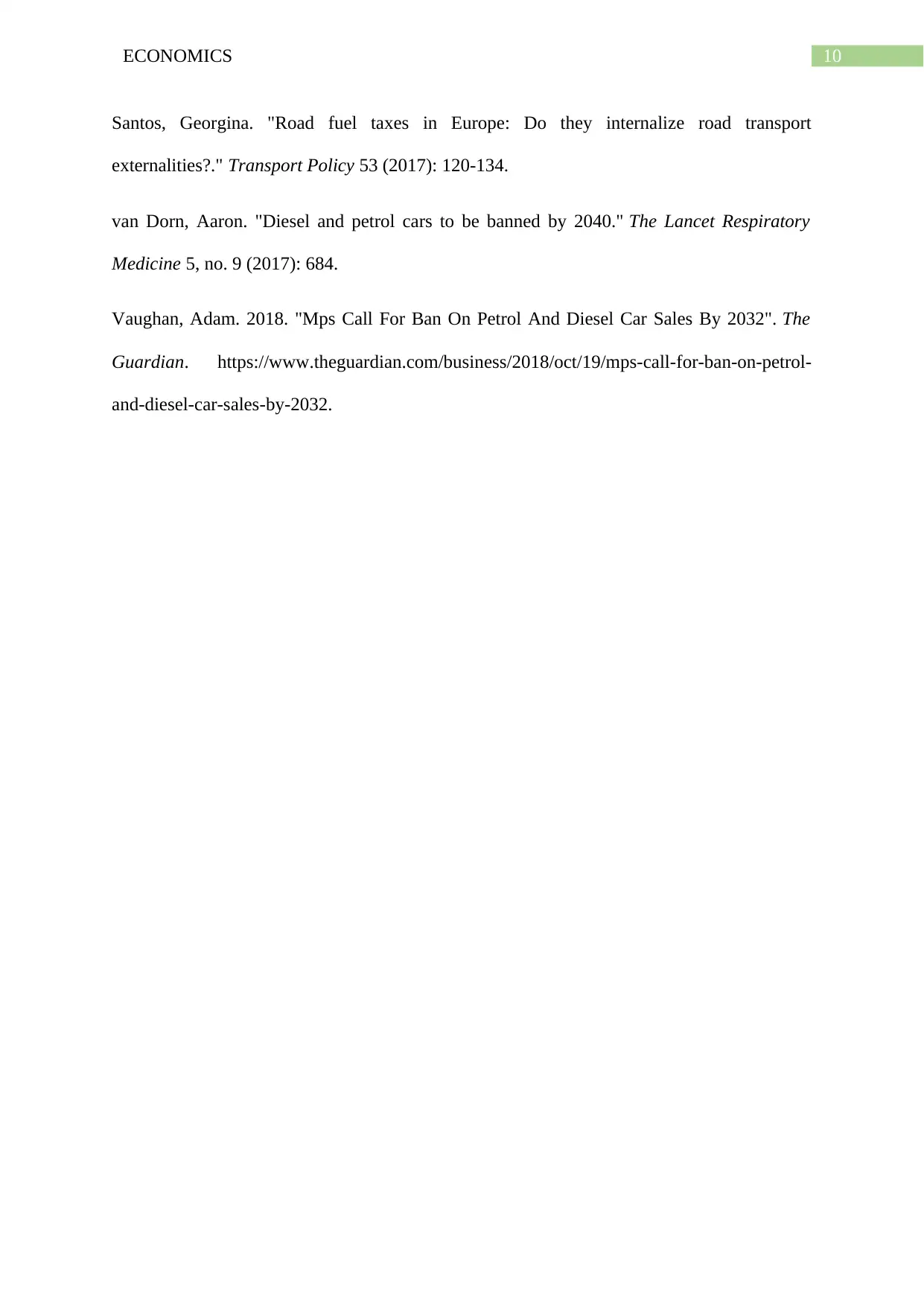
10ECONOMICS
Santos, Georgina. "Road fuel taxes in Europe: Do they internalize road transport
externalities?." Transport Policy 53 (2017): 120-134.
van Dorn, Aaron. "Diesel and petrol cars to be banned by 2040." The Lancet Respiratory
Medicine 5, no. 9 (2017): 684.
Vaughan, Adam. 2018. "Mps Call For Ban On Petrol And Diesel Car Sales By 2032". The
Guardian. https://www.theguardian.com/business/2018/oct/19/mps-call-for-ban-on-petrol-
and-diesel-car-sales-by-2032.
Santos, Georgina. "Road fuel taxes in Europe: Do they internalize road transport
externalities?." Transport Policy 53 (2017): 120-134.
van Dorn, Aaron. "Diesel and petrol cars to be banned by 2040." The Lancet Respiratory
Medicine 5, no. 9 (2017): 684.
Vaughan, Adam. 2018. "Mps Call For Ban On Petrol And Diesel Car Sales By 2032". The
Guardian. https://www.theguardian.com/business/2018/oct/19/mps-call-for-ban-on-petrol-
and-diesel-car-sales-by-2032.
1 out of 11
Related Documents
Your All-in-One AI-Powered Toolkit for Academic Success.
+13062052269
info@desklib.com
Available 24*7 on WhatsApp / Email
![[object Object]](/_next/static/media/star-bottom.7253800d.svg)
Unlock your academic potential
© 2024 | Zucol Services PVT LTD | All rights reserved.





